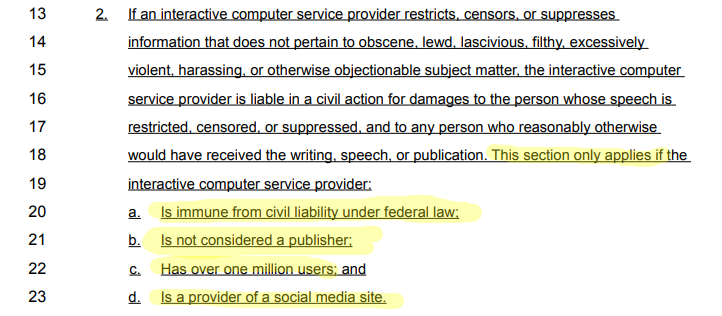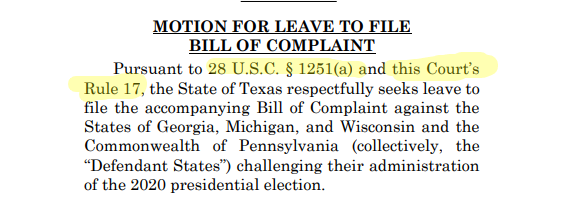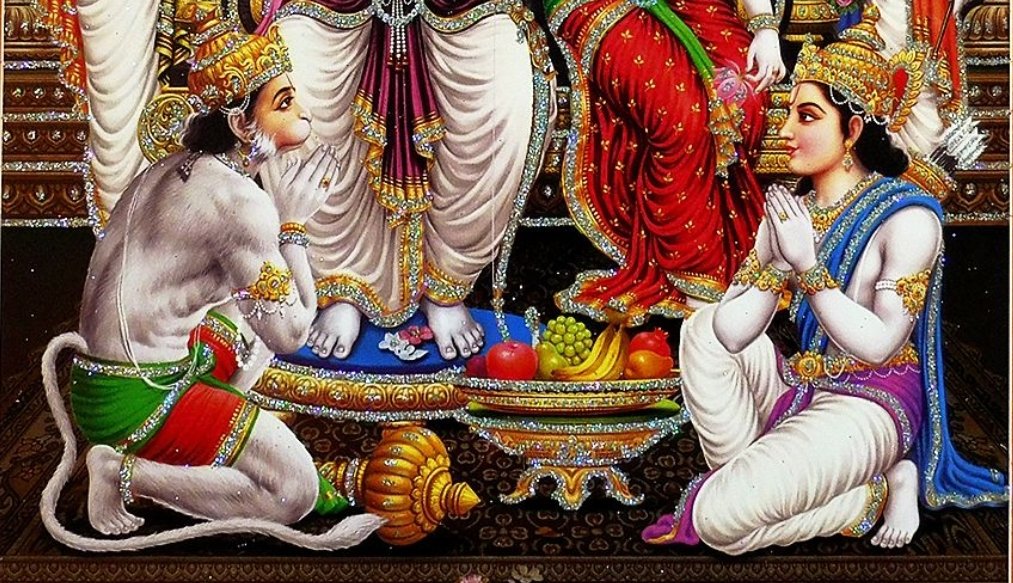Let's talk about this North Dakota attempt to legislate around Section 230 and create a civil right of action for users censored by social media sites. CC @mmasnick
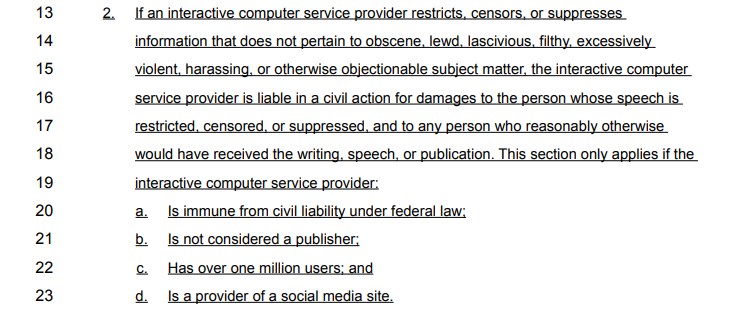
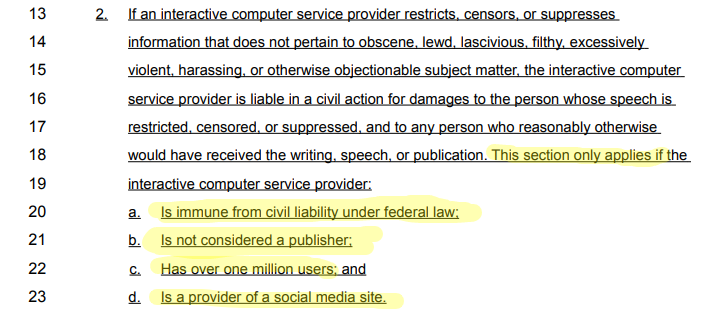
First of all, who gets to decide whether content fits into these highlighted categories? Do they actually think that the government will get to decide what counts as "otherwise objectionable"?
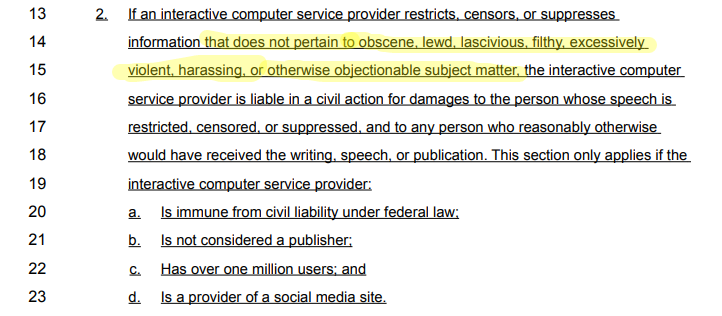
Also, what's "excessively violent"? "Violent" has a potential objective meaning, but
And, again, not one that the government gets to make for private citizens, under the First Amendment
In other words, this law would create liability only if social media sites banned users for content THE SITE ITSELF was fine with
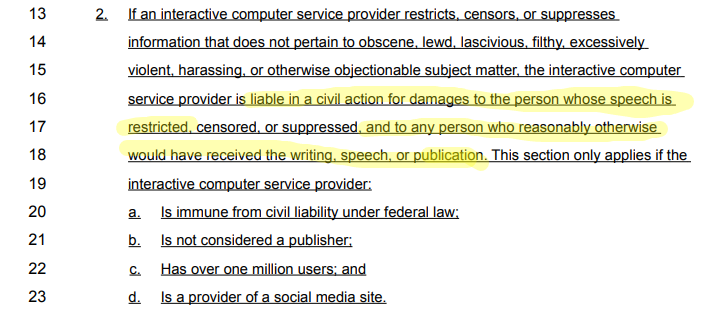

More from Akiva Cohen
\U0001f6a8BREAKING: Trump files new federal court lawsuit in Wisconsin challenging the results of the election.https://t.co/LfKb2PUIkq
— Marc E. Elias (@marceelias) December 3, 2020
Not, I hope, Seth Abramson long. But will see.
I apologize in advance to my wife, who would very much prefer I be billing time (today's a light day, though) and to my assistant, to whom I owe some administrative stuff this will likely keep me from 😃
First, some background. Trump's suit essentially tries to Federalize the Wisconsin Supreme Court complaint his campaign filed, which we discussed here.
OK, #squidigation fans. This is a new Wisconsin case not filed by the Krake[n/d] team of Powell and Wood and NOT focusing on wild conspiracy theories. It's a competent and professional filing that raises things that would be real issues ... if you don't understand why they aren't https://t.co/ETvUiWV5du
— Akiva Cohen (@AkivaMCohen) December 1, 2020
If you haven't already, go read that thread. I'm not going to be re-doing the same analysis, and I'm not going to be cross-linking to that discussion as we go. (Sorry, I like you guys, and I see this as public service, but there are limits)
Also, @5DollarFeminist has a good stand-alone thread analyzing the new Federal complaint - it's worth reading as well, though some of the analysis will overlap.
Every one of these Trump election suits is the same gobbledygook garbage barge:
— Liz Dye (@5DollarFeminist) December 3, 2020
FRAUD!
It coulda happened.
Well, no, we can't prove it.
But just to be safe, best let the gerrymandered legislature give us all the electoral votes!https://t.co/Z926668H05 pic.twitter.com/xGZsJKIO7Y
Hi, #Squidigation fans. New developments in the Michigan tentacle. Driving little man to school this morning, but we can talk about it when I get back https://t.co/m6GxK7g5T1
— Akiva Cohen (@AkivaMCohen) December 7, 2020
First: 11th Amendment Immunity. Basically, states (and their officials) have sovereign immunity; you can't sue them in Federal Court except to the extent that they agree to be sued there. Quick thumbnail of the doctrine here
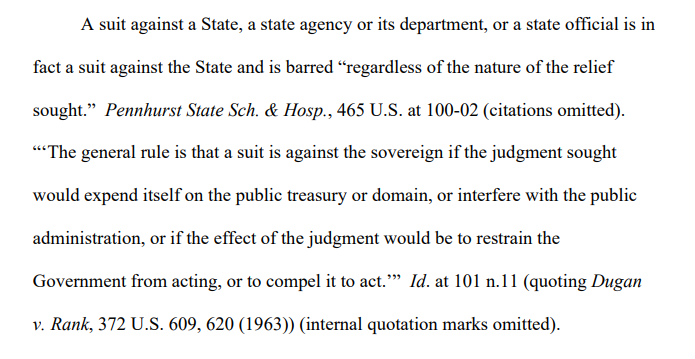
There are only 3 exceptions to this: 1) Congress says "you can sue your state for this"; 2) the state agrees to be sued; 3) Younger, a case that said "you can sue your state if you are just seeking an order saying 'stop violating my rights'"
In other words, if the state passes a law that says "no talking politics in public" you can sue for an order saying "that's unconstitutional and can't be enforced" but not for damages from having your 1A rights violated in the past
I'm sure you can see where this is going: Exceptions 1 and 2 don't apply; Congress didn't say "no sovereign immunity" when it passed 42 USC 1983 (the civil rights statute the plaintiffs sued under) and Michigan hasn't waived it. That leave Younger as the only remaining option
Here's the meat of their intro: Amazon isn't being fair to us. They're holding us to a higher standard than Twitter - they say we allow violent content, but look what Twitter does!
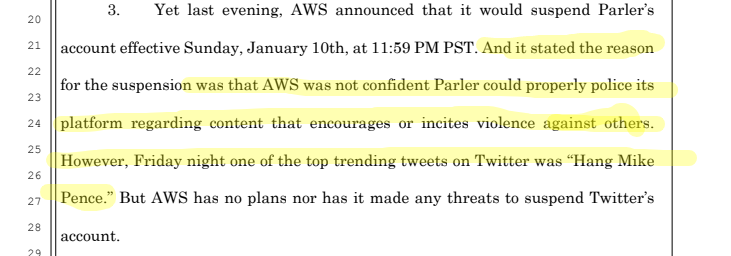
There are a few problems with this approach. First, there's a factual problem: Twitter and Parler take very different approaches to moderation. Hell, *that's Parler's entire pitch.* So "we're the same as Twitter, why are you treating us different" isn't going to fly
ALSO, the hashtag was mostly people saying "these folks are calling to hang Mike
Five minutes of scrolling a search for #hangmikepence, a gallery: pic.twitter.com/40hsyJNK50
— Jawafawa (@jawafawa) January 11, 2021
And ALSO also, did anyone notice any prominent right wingers complaining about losing tens of thousands of followers yesterday? You know why they did? Because Twitter has been active in deleting accounts that violate its TOS
More from Government
Texas Gov. Abbott blames solar and wind for the blackouts in his state and says "this shows how the Green New Deal would be a deadly deal for the United States of America" pic.twitter.com/YfVwa3YRZQ
— Andrew Lawrence (@ndrew_lawrence) February 17, 2021
2. Point 2: there were clear signs the grid would get overloaded under extreme cold conditions. Why? Due to a vacuum of regulations mandating winterization of turbines and power generators. This from sources, in Texas!
3. Point 3: Of the power shortfall that hit Texas, over 80% was due to problems at coal and gas fired plants. Power generators were just not winterized. Decisions to do so have been ignored since the 1990s.
4. Point 4: these are winterized wind turbines in Denmark. The ocean is frozen. The turbines are generating.
Same thing in Denmark. It's cold enough here that the ocean is frozen and yet look at those reliable windmills just chugging along. pic.twitter.com/1NTljk7hk9
— Elizabeth Gummere (@BethGummere) February 17, 2021
5. #Texas| the main issue is: catastrophic governance at the State level (no Federal oversight of the Texas grid) failing to allocate funding to winterise the Natural Gas, Coal and Wind Turbine elements that contribute to the grid. (~ 80/20
You May Also Like
Why is this the most powerful question you can ask when attempting to reach an agreement with another human being or organization?
A thread, co-written by @deanmbrody:
Next level tactic when closing a sale, candidate, or investment:
— Erik Torenberg (@eriktorenberg) February 27, 2018
Ask: \u201cWhat needs to be true for you to be all in?\u201d
You'll usually get an explicit answer that you might not get otherwise. It also holds them accountable once the thing they need becomes true.
2/ First, “X” could be lots of things. Examples: What would need to be true for you to
- “Feel it's in our best interest for me to be CMO"
- “Feel that we’re in a good place as a company”
- “Feel that we’re on the same page”
- “Feel that we both got what we wanted from this deal
3/ Normally, we aren’t that direct. Example from startup/VC land:
Founders leave VC meetings thinking that every VC will invest, but they rarely do.
Worse over, the founders don’t know what they need to do in order to be fundable.
4/ So why should you ask the magic Q?
To get clarity.
You want to know where you stand, and what it takes to get what you want in a way that also gets them what they want.
It also holds them (mentally) accountable once the thing they need becomes true.
5/ Staying in the context of soliciting investors, the question is “what would need to be true for you to want to invest (or partner with us on this journey, etc)?”
Multiple responses to this question are likely to deliver a positive result.


